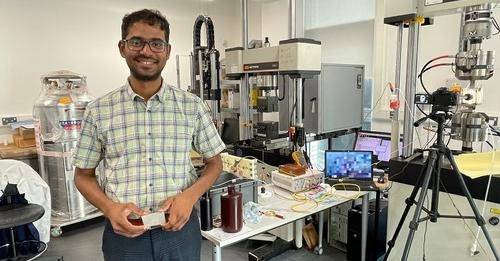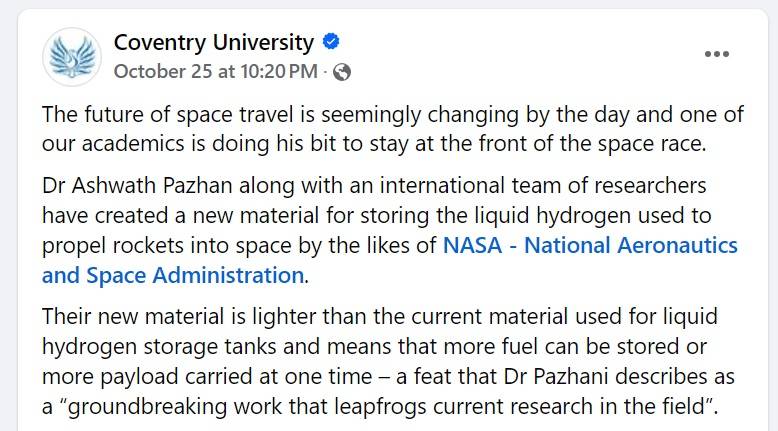Coventry University's Academic Creates New Material For Space Vessels To Travel Longer
Coventry University is contributing significantly to the ever-changing field of space travel. Its academics have participated in the creation of new materials for space vessels.
Study in UK: Coventry University has said that it is doing its bit to stay ahead in the constantly changing space travel. Dr Ashwath Pazhani from the university along with the other international researchers have created a new material for space vessels to store liquid hydrogen which is used by the likes of NASA to propel rockets into space.
Dr Ashwath Pazhani, Lecturer in Engineering Design and Materials Specialism said, "This all started as I was looking for the super lightweight and load-bearing material for external fuel tanks. The material in question has been used since 1993 to store liquid hydrogen and yet in this work we innovatively reinforced this material with nano graphene, creating a new composite out of that. We have been able to reduce overall external tank weight by 2%, which is 19,400kg of total weight reduction and that can be utilised towards sending 19 tons of extra payload in every space flight. This means space vessels can travel longer distances as well as carry more payloads. This is a significant innovation in liquid hydrogen storage and the material is the first of its kind. This achievement is groundbreaking in terms of sustainable energy solutions, aligning with global goals for cleaner and more efficient energy systems."
"In addition to its technical merits, it has also played an important role in promoting inclusivity and diversity in STEM, actively encouraging women to participate and lead in scientific breakthroughs. Alicia’s contribution is a shining example of how student involvement can drive impactful research," added Dr Ashwath Pazhani.
Coventry University's Material For Space Vessels: More Details
What is considered groundbreaking in this field is that the new material is much lighter than the earlier materials used to store the liquid hydrogen. It will help in the storage of more fuel and also improve the payload carried at one time.
"The future of space travel is seemingly changing by the day and one of our academics is doing his bit to stay at the front of the space race.
Dr Ashwath Pazhan along with an international team of researchers have created a new material for storing the liquid hydrogen used to propel rockets into space by the likes of NASA - National Aeronautics and Space Administration. Their new material is lighter than the current material used for liquid hydrogen storage tanks and means that more fuel can be stored or more payload carried at one time – a feat that Dr Pazhani describes as a “groundbreaking work that leapfrogs current research in the field," says the Facebook account of the Coventry University.
Dr Ashwath Pazhan conducted the research collaboratively with Dr Andre Batako from Liverpool John Moores University, Professor Anthony Xavior from Vellore Institute of Technology in India, and Dr Dirk Honecker at the Rutherford Appleton Laboratory. The researchers hope that the material will provide the sustainable storage of liquid and gaseous hydrogen in the coming years for underground storage for fuel stations, domestic household purposes and for transport systems including marine, automotive, and aviation.
Read more:

With over 11 years of dedicated experience in the field of Study Abroad consulting and writing, Pallavi Pathak stands as a seasoned expert in providing compelling news articles and informative pieces tailored to the... Read Full Bio



